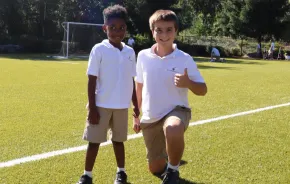
Do you have a child who aces standardized tests but struggles to turn work in on time? Or maybe, like me, you have a son who built his own computer but can’t ever seem to find both soccer cleats at the same time?
If you are the parent of a child who perennially brings home report cards with the dreaded “Capable of better work” comment, you know how uniquely frustrating it can be to have a kid who seems to personify the stereotype of the “absent-minded professor.”
You may also be glad to learn, as I was, that you are far from alone. Many bright and capable kids struggle in areas like time management and organization. Happily, there are many strategies and resources that can help.
Why are so many smart kids disorganized?
In an article published on the Brainy-Child website, Inderbir Kaur Sandhu, Ph.D., explains, “It is a fact that gifted children can be quite disorganized. This is due to the quick-paced minds of these children cognitively, [which keep] them busy thinking over thousands of things at one time.” She adds, “They often find schoolwork rather easy, and this causes them to do their tasks quickly and without much thought, … [causing] them to lack skills in time management, organization, studying and sometimes prioritizing.”
This was the experience of Lindsay, a Seattle-area mother of two. She says of her son Sam, “He cruised through elementary school, to be honest. He finished his classwork before everybody else and never had to bring anything home. We were completely shocked when he hit middle school and started failing classes because he couldn’t keep track of all his teachers’ expectations and homework. We were so frustrated, but eventually we realized that he had never learned how to study.”
Ana Homayoun, a school consultant and author of “That Crumpled Paper Was Due Last Week” and other titles, identifies several types of students who struggle with organization, including kids who are overscheduled, kids who master technology easily but are also distracted by it, and intellectual and creative kids who excel in particular areas but don’t have the skills they need to succeed in school. She also notes that while her work used to be primarily with boys, she is seeing increasing levels of distraction in girls, a trend she traces to technology use, particularly of kids’ ever-present smartphones.
Brain under construction
Every expert I talked to about strategies to support scatterbrained students pointed out that the last part of the brain to develop fully is the frontal lobe, which, among other key functions, governs the so-called executive functions. This “control panel” of the brain doesn’t fully mature until we’re in our 20s. Put simply, kids are being asked to apply time management and organization skills that their developing brains haven’t mastered yet.
Richard Guare, Ph.D., and Peg Dawson, Ed.D., coauthors of “Smart but Scattered Teens,” explain the term “executive functions” as a diversity of cognitive processes and “brain-based skills required for humans to effectively execute, or perform, tasks and solve problems.” In other words, the very collection of fundamental habits of mind required for getting organized, sustaining attention, managing time, and controlling impulses and emotions that every student needs in order to succeed in school.
Children who struggle with these functions “do not lack the intelligence to know better, but they lack the executive skills to help them use that intelligence,” say the authors.
Some children who have executive function challenges have ADHD or other learning differences, but children with no diagnosis can also have problems with skills like organization and time management, according to Homayoun. Happily, parents and educators can assist children in developing these important skills.
How parents can help
Jackie Stachel, director of communications for Beyond BookSmart, an executive function coaching company, says, “Unlike learning algebra or French, students don’t typically get explicit instruction in how to be organized and how to manage their time effectively. Some students eventually learn these skills through trial and error — but any student can benefit from direct teaching of strategies to help them be more effective and productive.”
Sinead Coleman, a learning specialist at Charles Wright Academy in Tacoma, offers this helpful insight as food for thought: “The most important thing I’ve learned about student study skills is that no one tool serves every student, and students need to be shown multiple options to find the one that they feel works best for them.”
For Lindsay and Sam, this meant working with his teachers to make sure his planner was correctly filled out at the end of each day. They also created a special area for him to focus on homework outside of his bedroom, and they agreed that if he was feeling overwhelmed, he could stop for the day and Lindsay would write a note to Sam’s teacher. Happily, with these small changes, Sam became more confident in his ability to manage his own work, and as his grades went up, he felt better about school — and their entire household felt calmer.
Here are expert tips to help set your scatterbrain up for school success
Start small
Lesley Todaro, LMFTA, is a cofounder of the Hallowell Todaro ADHD Center, where she and her team work with families affected by ADHD and related conditions. She emphasizes the importance of starting with small goals so that kids can experience success and positive feedback, without becoming overwhelmed.
Set up systems
Students benefit from having a consistent routine for tackling tasks, especially schoolwork. It is particularly important that they learn to use a planner to record deadlines and break out tasks.
Stay positive
It’s likely that kids who are smart but disorganized already have a negative self-image, so it is important to focus on their strengths and remain optimistic.
Offer the right amount of support
While children ultimately need to become independent, it is important to provide students with appropriate support in a manner that creates scaffolding for success. For example, in our house, we start with weekly grade checks and then go to monthly and quarterly checks if our son is managing due dates and successfully completing work by himself.
Get help
It is important that your child is involved in identifying his own goals. If you are struggling to collaborate with your child, it may be time to involve other helpful adults.
Resources for supporting distracted kids
All children can be successful if given the right tools and support. As Jackie Stachel of Beyond BookSmart consulting says, “We find that when students know how to go about their work, they are willing to try. That’s why we like to say, ‘Where there’s a way, there’s a will.’” The following are books, websites and apps that will help parents and kids get ready for a more organized school year ahead.
Books
- “Your Kid’s Gonna Be Okay: Building the Executive Function Skills Your Child Needs in the Age of Attention” by Michael Delman
- “That Crumpled Paper Was Due Last Week: Helping Disorganized and Distracted Boys Succeed in School and Life” by Ana Homayoun (Note: While this book focuses on boys, the strategies outlined are useful for any child. Ann Dicks, director of the lower school at Annie Wright Schools in Tacoma, frequently recommends this title to parents.)
- “Smart but Scattered: The Revolutionary ‘Executive Skills’ Approach to Helping Kids Reach Their Potential” by Peg Dawson, Ed.D., and Richard Guare, Ph.D.
Planners for older kids
- “The Work-Smart Academic Planner: Write It Down, Get It Done” by Peg Dawson, Ed.D., and Richard Guare, Ph.D.
- Chaos Coordinator! Academic Planner by FlyHigh Press
Tools and resources
- “ADDitude,” which bills itself as “the magazine for living well with attention deficit and learning disabilities,” maintains a list of helpful apps and is a great general resource for families.
- Time Timer is a visual timer that overlays a traditional analog clockface, providing kids with a visual representation of the time remaining to complete a task.
- Visual calendars can be purchased at low cost (check the Teachers Pay Teachers website for dozens of great resources) or created at no cost ― look on Pinterest for ideas.
- Whiteboards or similar write-on calendars can also be helpful for keeping your student on task and on track. In our family, we use Google Calendar to record appointments so that we get alerts, but we also have one central adhesive, write-on board where we note standing appointments and schedules.
- Children should have one designated place to keep their papers. Many find it helpful to have a separate colored folder or binder dedicated to each subject.
Online and in-person support and coaching
- If your child has ADHD or you suspect he or she may, area Children and Adults with Attention-Deficit/Hyperactivity Disorder (CHADD) groups provide excellent resources, evidence-based information, face-to-face support and advocacy.
- The Hallowell Todaro ADHD Center, with offices in Kirkland and Seattle, provides therapy, parent coaching and other services to families affected by ADHD and related conditions.
- Beyond BookSmart provides one-on-one online executive function coaching to students and adults worldwide.
Editor’s note: This article was originally published in September 2019, and updated in September 2020.











